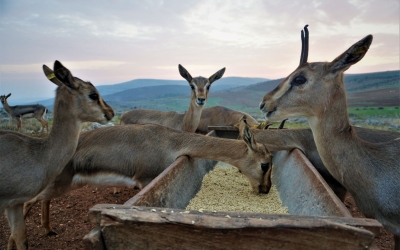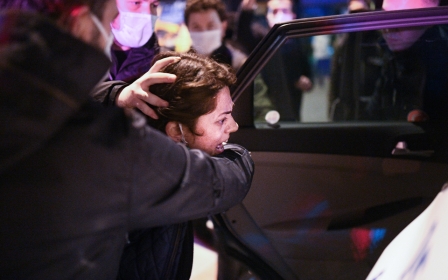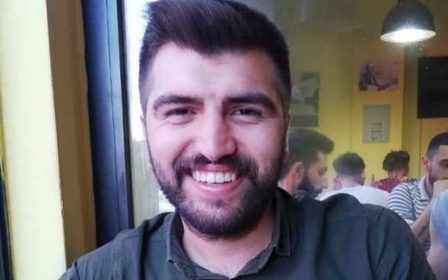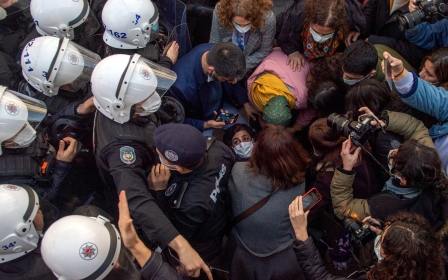Turkey's Bogazici student protests descend into culture war
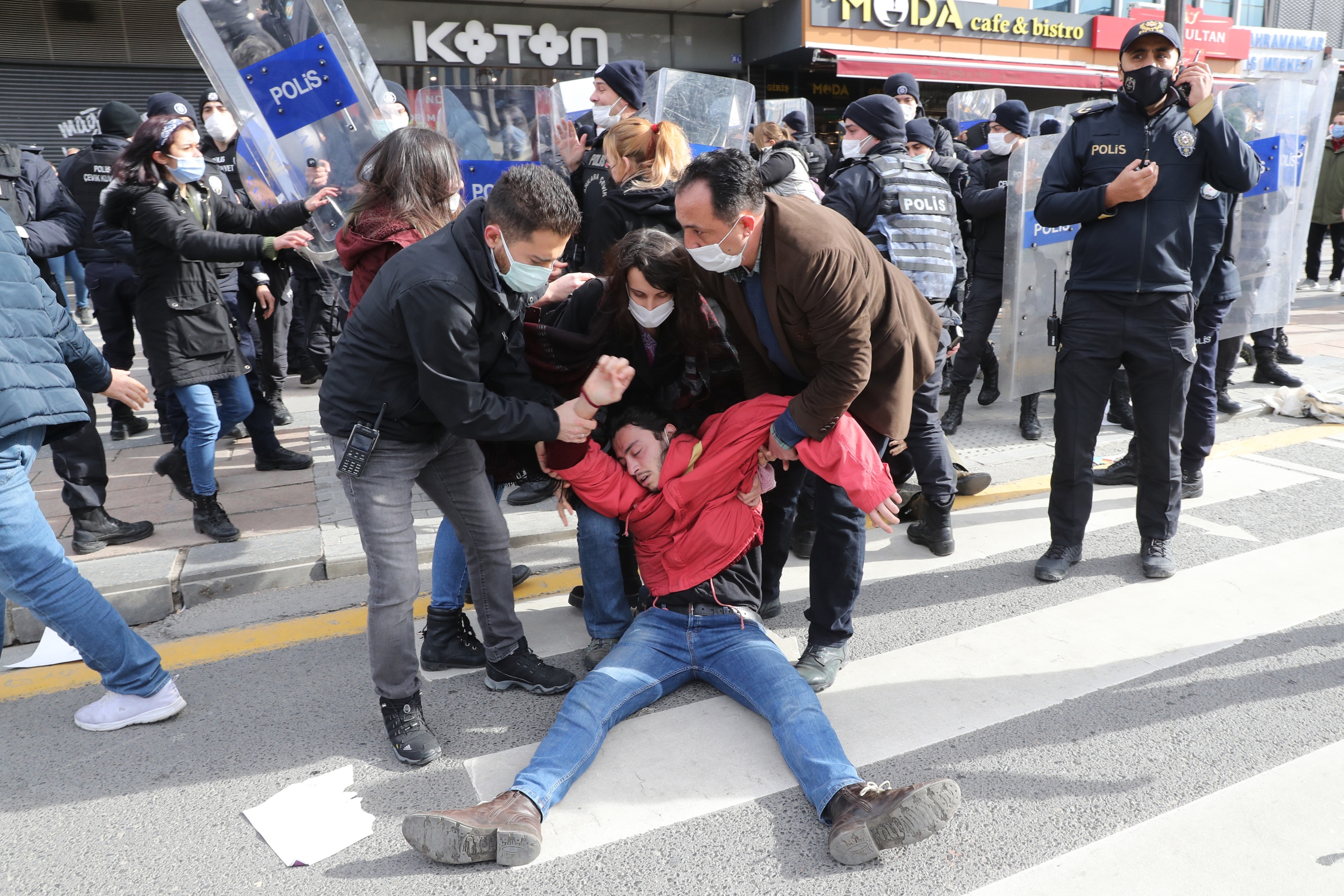
It might not be obvious how a series of demonstrations by students and staff over the government appointment of a new rector to a leading Turkish university could end up transforming into a battle over LGBT rights.
But that's what happened. Hundreds of students from Bogazici University in Istanbul have already been arrested since a decision in January by Turkish President Recep Tayyip Erdogan to appoint Melih Bulu, a former parliamentary candidate for the ruling Justice and Development Party (AKP), as rector of the university.
However, a controversy over a piece of protest art and the vocal pro-LGBT stance of the Bogazici students has seen the issue spiral into a culture war, leaving many LGBT activists fearful of a conservative backlash amid the spread of homophobic rhetoric.
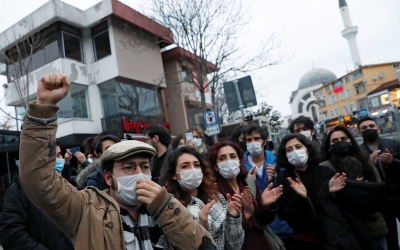
Havin Ozcan, a Kurdish LGBT rights activist and student at Bogazici, was arrested after participating in a demonstration over the rector's appointment in early January.
"During the action, the police used gas and plastic bullets. At midnight, my house was raided with long-barrelled guns and I was subjected to sexual verbal violence by the police," he told Middle East Eye.
While in custody he and other activists were strip-searched and subjected to further abuse, including homophobic slurs.
"The cops threatened me with rape," Ozcan said.
A number of other Bogazici LGBT activists, such as Yildiz Idil Sen and Azad Aksoy, have been arrested and subjected to abuse. At the same time, the rainbow LGBT flag has become ubiquitous at protests, with the original anger over government interference branching out into other issues.
Though Bogazici University had informally held internal elections to select candidates for rector since 1992, in 2016 - in the wake of the July coup attempt - the government used a state of emergency to change the process that selects the rector, giving the power to the Turkish president.
'Provoking the public to hatred'
Bulu's appointment, which stood in contrast to a long tradition of internal elections, raised fears that the government was seeking to expand its influence over the previously staunchly independent institution, mirroring similar moves to centralise power in other aspects of Turkish society.
Among the material that appeared among the demonstrations was a piece of student artwork depicting the Kaaba in Mecca alongside LGBT symbolism and Persian mythological figures.
'We stand against the male-dominated fascist system'
- Havin Ozcan, LGBT activist
The image was seized upon by the government and its supporters, who denounced it as insulting to Islam.
On Friday, the Istanbul chief public prosecutor's office announced it had completed its investigation into the artwork and said it would be demanding that seven students - two of whom are currently under arrest - be sentenced to one to three years in prison on the charge of "publicly provoking the public to hatred and hostility".
The indictment said: "The action in question, being beyond an abstract disrespect and rejection, was suited to display hostile behaviour to a segment of society or to intensify such behaviour."
In Ozcan's view, the government's attempts to whip up resentment against LGBT people were part of a broader crackdown against the opposition, taking advantage of widespread suspicion and prejudice against the community.
As someone of Kurdish background, he said he understood that different minority identities, and the attempts to crack down on them, often intersected.
"We stand against the male-dominated fascist system. This government is fed by this system, so they try to destroy our resistance to their moralist-reactionary regime by targeting us first," he said.
"This political Islamist power is trying to destroy us by exploiting the religious values of society."
Restrictions and pressure
One of the first moves made by Bulu after assuming the rectorship was to close down the Bogazici LGBTI+ studies club.
Though he claimed following the closure of the organisation that he was in fact someone who "defends the rights and freedoms of LGBT individuals", the move further angered many on campus.
Surveys suggest an increasing minority in Turkey (particularly among younger demographics) regard homosexuality as acceptable, and the issue has become increasingly important among many left-wing and liberal political parties and activists.
With the Bogazici protests mounting, the government and its supporters pounced on the Kaaba image to denounce the student movement as a whole.
'I know that we are right. Our protest is peaceful and it will continue'
- Gokce Babayigit, student
Interior Minister Suleyman Soylu reported the arrest of "four LGBT freaks" over the display, condemning them as "degenerates" on Twitter. His tweet was later flagged over its hateful content.
The latest clash over LGBT rights has arguably been ongoing since April 2020 when Ali Erbas, head of Turkey's Directorate of Religious Affairs, denounced homosexuality in a sermon as a "kind of evil" that "brings illnesses and corrupts generations".
Since then, there has been a near-constant stream of outrage from conservatives in Turkey over the perceived import of LGBT "ideology" into the country.
Among the controversies were Netflix's decision last year to cancel the production of a Turkish series featuring a gay character after failing to win the government's permission to film. Meanwhile, in June, the French sporting goods retailer Decathlon was targeted by a Turkish media boycott campaign, after saying it supported the LGBT community.
According to Turkish LGBT rights organisation Kaos GL, 2020 saw the publication of more than 2,000 news articles it deemed discriminatory, a 40 percent jump from 2019.
While Erdogan once appeared to tentatively support protecting the rights of LGBT people, anti-LGBT rhetoric from the government has grown increasingly loud and the freedom for activists to demonstrate has shrunk. This is perhaps most visible in the continuing ban on the Istanbul Pride marches, which began in 2003 and continued every year until they were banned in 2016 following threats from far-right groups.
"LGBTI communities, individuals and organisations are under a huge amount of restrictions and pressure," Milena Buyum, a campaigner for Amnesty International, told MEE.
"The blanket ban on all LGBTI events in Ankara is not such a long time ago, that went on for two years," she said.
"Istanbul Pride has been banned since 2016, in Izmir and other places Prides have been banned, so there has been a regression in the public space for visibility of LGBTI people and organisation.”
'Protest is our right'
Scores of students have been arrested since the beginning of the protests on 4 January.
According to the Arti Gercek news website, at least 41 protesters are currently in home detention, monitored by electronic tags attached to arms or legs.
One Bogazici student, Gokce Babayigit, said she had narrowly escaped being swept up in a wave of arrests on 1 February because she had refused to allow police to check her bag prior to the protest and was then held for an hour.
"My house is very close to the university and these days our neighbourhood is full of police," she said, speaking to MEE via WhatsApp.
"They want to touch us, look through our bags without official permission. We know that protest is our right but when we try to use this right they beat us and arrest us."
Since early January, academic staff have held a vigil outside the rectorate building, wearing academic gowns and with their backs turned to the building.
Both supporters and opponents of the protests have compared them to the 2013 Gezi Park demonstrations, which saw a protest over the destruction of a green space in Istanbul spiral into a nationwide anti-government movement.
That movement, while partly focusing on economic, governmental and environmental issues, also reflected the deep social divides across the country, where attitudes towards sexuality, religion, gender and lifestyle are often furiously fought over.
Babayigit, who is a member of the Bogazici Women+ Solidarity group, emphasised that - while they were no fans of Bulu - it was the process by which he was appointed that they were primarily concerned about.
"He is partisan, homophobic and his articles included plagiarism," she explained, referring to allegations over his 2003 thesis.
"But the point is the method of the appointment - we want a democratic method."
'Over in six months'
Bulu has attempted to keep relatively quiet since the controversy erupted, apart from confirming that he would not be stepping down from his position and predicting that the crisis would "all be over in six months".
The same cannot be said of other senior political figures in Turkey.
"Venomous snakes whose heads should be crushed," was how Devlet Bahceli, leader of the far-right Nationalist Movement Party (MHP), characterised the student demonstrators, in a tweet that was eventually removed by Twitter.
Human rights groups and foreign powers, including the EU and the US, have denounced the inflammatory rhetoric, as well as comments targeting LGBT people.
"The students have absolutely the right to express their dissent and protest and hold sit-ins peacefully and have their voices heard. This is what happens when you are expressing your right to freedom of expression," said Amnesty International's Buyum.
"We are witnessing a really serious crackdown on a student movement which is expressing its demands in peace and calm and which is experiencing police violence, detention and, down the line, prosecution."
Despite attempts by the government to rally its support base against the protesters, there have been indications its argument is failing to cut through.
Polls have suggested there is widespread opposition to "political" appointees for university rectorships, including from AKP supporters.
Abdurrahman Dilipak, a conservative columnist and AKP supporter, also chimed in last month suggesting that the move to appoint Bulu was "causing problems at the party branches" and suggested that "the method of appointment must be reconsidered".
Babayigit said the outpouring of support for the students seen across the country had made her feel "proud, strong, more determined" to continue protesting.
"I know that we are right. Our protest is peaceful and it will continue," she said.
Middle East Eye delivers independent and unrivalled coverage and analysis of the Middle East, North Africa and beyond. To learn more about republishing this content and the associated fees, please fill out this form. More about MEE can be found here.


